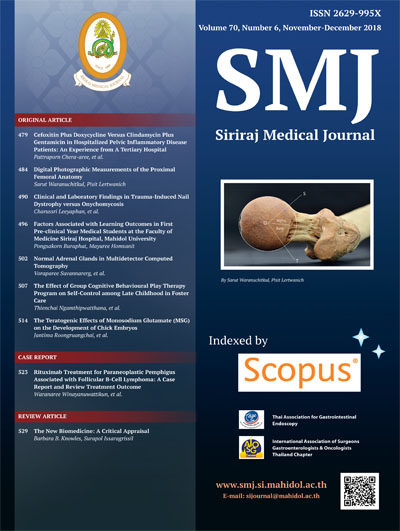The Effect of Group Cognitive Behavioral Play Therapy Program on Self-Control among Late Childhood in Foster Care
Keywords:
Self-control; group cognitive behavioral play therapy; late-childhood; foster childAbstract
Objective: To develop and evaluate the effectiveness of group cognitive behavioral play therapy program on selfcontrol in foster care for late childhood.
Methods: The program was developed by researchers and validated by 3 experts, and consisted of one individual session and 14 group sessions. Twelve boys with age 8-10 years at Mahamek Home for Boys attended the 40-50 minutes group session twice a week for 7 consecutive weeks. The effectiveness of the program was evaluated pre and post- intervention by using Self-Control Skill in 5 Situational Test and externalizing domains in Thai Youth Checklist (TYC). Descriptive statistics, Wilcoxon Signed Ranks Test, and qualitative analysis were used in data analysis.
Results: The participants were 12 boys with age 8-10 years at Mahamek Home for Boys. They were studying primary education in public school and were fostered because of poverty, abandonment, and abuse. Comparison of changes between pre and post-intervention scores revealed increment in mean score of Self-Control Skill in 5 Situational Tests with p-value at 0.267, related to decrement in mean score of overall externalizing behavior problems in TYC with p-value at 0.086. Examined score in sub-domains of TYC found statistical decrease in aggression with p-value at 0.028 (p. <.05) as well as decrease in delinquency and impulsivity with p-value at 0.257 and 0.146, but found slightly increased immaturity domain with p-value at 0.892.
Conclusion: The program was effective in reducing aggressive behavior and had a tendency to improve self-control skill among 8-10 years old children in a foster care. However, the effectiveness of the program in long-term needs to be further investigated.
Downloads
Published
How to Cite
Issue
Section
License
Authors who publish with this journal agree to the following conditions:
Copyright Transfer
In submitting a manuscript, the authors acknowledge that the work will become the copyrighted property of Siriraj Medical Journal upon publication.
License
Articles are licensed under a Creative Commons Attribution-NonCommercial-NoDerivatives 4.0 International License (CC BY-NC-ND 4.0). This license allows for the sharing of the work for non-commercial purposes with proper attribution to the authors and the journal. However, it does not permit modifications or the creation of derivative works.
Sharing and Access
Authors are encouraged to share their article on their personal or institutional websites and through other non-commercial platforms. Doing so can increase readership and citations.











